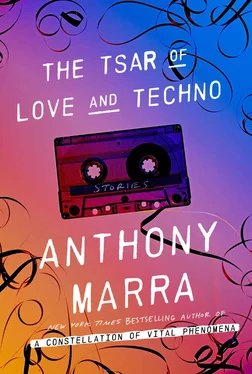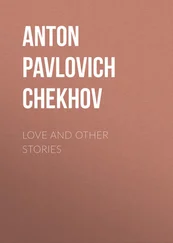Anthony Marra
The Tsar of Love and Techno: Stories
For Janet, Lindsay, and Rachel
It’s a minor work.
— Pyotr Zakharov-Chechenets, regarding his 1843 painting, Empty Pasture in Afternoon
LENINGRAD, 1937
I am an artist first, a censor second.
I had to remind myself of this two years ago, when I trudged to the third-floor flat of a communal apartment block, where my widowed sister-in-law and her four-year-old son lived. She answered the door with a thin frown of surprise. She wasn’t expecting me. We had never met.
“My name is Roman Osipovich Markin,” I said. “The brother of your husband.”
She nodded and ran her hand along the worn pleat of a gray skirt as she stood aside to allow me in. If the mention of Vaska startled her, she hid it well. She wore a blond blouse with auburn buttons. The comb lines grooving her damp dark hair looked drawn on by charcoal pencil.
A boy was slumped into the divan’s mid-cushion sag. My nephew, I supposed. For his sake, I hoped he took after his mother.
“I don’t know what my brother has told you,” I began, “but I work in the Department of Party Propaganda and Agitation. Are you familiar with the job?”
“No,” the boy said. The poor child had inherited his father’s forehead. His future lay under a hat.
To his mother: “Your husband really didn’t talk about me?”
“He did mention a brother who was something of the village idiot in Pavlovsk,” she said, a bit more cheer to her tone. “He didn’t mention you were balding.”
“It’s not as bad as it looks,” I said.
“Perhaps you could get to the purpose of your visit?”
“Every day I see photographs of traitors, wreckers, saboteurs, counterrevolutionaries, enemies of the people. Over the last ten years, only so many per day. Over the last few months, the usual numbers have grown. I used to receive a slim file each month. Now I receive one every morning. Soon it will be a box. Then boxes.”
“Surely you haven’t come only to describe the state of your office?”
“I am here to do my brother a final service,” I said.
“And that is?” she asked.
My vertebrae cinched together. My hands felt much too large for my pockets. It’s a terrible thing, really, when said aloud. “To ensure that his misfortune doesn’t become a family trait.”
She gathered every photograph she had of Vaska, as I asked. Nine in total. A marriage portrait. A day in the country. One taken the day they moved to the city, their first act as Leningraders. One of Vaska as a boy. She sat down on the divan and showed each to her boy for a final time before bringing them to the bedroom.
She arrayed them on the desk. Her bedroom was mainly bare floor. The bed still wide enough for three, the blanket neatly pulled over a flabby mass of pillows. She must have only shared it with her son now.
I slid a one-ruble coin across the desk, hammer-and-sickle side up.
“What am I to do with this?”
I nodded at the photos. “You know what to do.”
She shook her head, and with a sweep of her forearm that sent a small galaxy of dust motes into orbit, she winged the coin to the floor.
Could she have still loved my brother? Hard to believe. He’d been proven guilty of religious radicalism by an impartial and just tribunal. He’d received the only sentence suitable for a madman who poisoned others with the delusion that heaven awaits us. Paradise is possible only here on earth, possible only if we engineer it. One shouldn’t envy this woman’s blind devotion to a man who has proven himself unworthy of love. One mustn’t.
She pressed her palms over the photographs, threw her elbows out to shield the images with her broad back, an instinct that suggested a starving creature protecting her last morsels, and this may be true: The stomach is not the only vital organ that hungers.
“Leave,” she said, a ragged edge to her voice. She stared at the back of her hands. “Leave us be.”
I could have turned, walked out of the room, closed the door on the whole affair. I’d done more than was required already. But something kept my heels pinned to the floorboards. Even though the concept of family was slipping into history as swiftly as the horse and carriage, I didn’t have a wife or child of my own, and I wanted someone who shared my blood to live to see that paradise we’ve given ourselves to achieve. I wanted that little fellow out there on the divan to grow up, to become an active builder of communism, to look back on his life when he is a fat and happy old man, to know that the faultless society surrounding him justifies his father’s death, and then, to be grateful for the lesson taught by the uncle he briefly met on a cold winter morning a lifetime ago.
It’s silly. I know.
I grabbed her wrist and pinched the coin between her fingers.
“I’m not here to hurt you,” I told her. “I’m here to make sure you don’t get hurt. Your husband was an enemy of the people. What do you think will happen if NKVD men search the flat and find all these photographs? Must I go into greater detail?”
Whatever naked sentiment splayed itself across the table recoiled within her. She kept hold of the coin when I let go. That coin could have bought a meat pie, a sketch pad, a confectionary, a bar of soap; pressed into someone else’s palm it could have become the bright spot in a dull day, but coins cannot choose their fate.
“Why can’t you do it? You’re the artist. This is your job.”
I checked my watch. “I don’t begin work for another hour.”
When I heard the slow scratch of the coin on photo paper, I turned away. In the living room, the boy sat quietly peering at the thin lines etched upon his palms.
It was uncanny how much he resembled his father. A nose he hadn’t yet grown into; a messy thatch of black hair, each follicle aimed in a different direction; lips pursed as small as a button. I would have been eight when Vaska was his age. Summer days we roamed the forests and fields, and at night we tapped coded messages to each other through the wall between our rooms; we each had our own. I made him sit for me in every shade and season of light so that I could sketch his likeness, could preserve his expression in charcoal on the page. If not for Vaska, I would have never become an artist. His face was my apprenticeship.
“Do you speak?” I asked.
He nodded.
“With understatement, I see. Tell me your name.”
“Vladimir.”
I clasped his shoulder and he flinched, surprised by the sudden gesture of affection. He shared his first name with Lenin — an auspicious sign.
“I want to see if you can do something for me,” I asked. “Are you willing to try?”
He nodded.
“Stare straight at me,” I instructed, then I flashed my fingers by his ear. “How many am I holding up?”
He held up four fingers.
“Very good. You’ve got keen eyes. Someday you might be a sharpshooter or a watchman. I’m going to tell you the story of the tsar and the painting. Have you heard it?”
The coin scratching in the bedroom might have been wind rustling leaves; we might have been far from there, near a dacha, in a field, the sun burning just over our heads.
“No, I didn’t think you would have,” I said. “It begins with a young man who overthrows an evil tsar. The young man becomes the new tsar. He promises his subjects that their troubles will disappear if they obey him. ‘What will this new kingdom look like?’ his subjects ask. The tsar considers it and then commissions his court painters to paint a picture of what the new kingdom will look like.
Читать дальше












